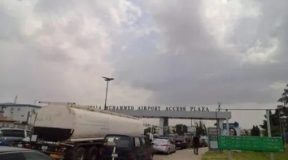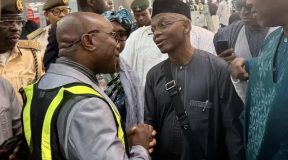The Nigerian National Petroleum Company Limited has stopped importing refined petroleum products and is now off-taking fuel from the Dangote Petroleum Refinery and other local refineries.
NNPC’s Group Chief Executive Officer, Mele Kyari, disclosed this on Monday at the ongoing conference of the Nigerian Association of Petroleum Explorationists, which was held in Lagos and themed ‘Resolving the Nigerian Energy Trilemma: Energy Security, Sustainable Growth and Affordability’.
This is coming at a time when some petroleum marketers insisted that they would import petroleum products and sell at a price lesser than that of the $20bn dollar refinery.
In August, President Bola Tinubu said the country spent an average of N2tn on fuel importation monthly.
According to Tinubu, the launch of compressed natural gas into the country would save the country “over N2tn a month used to import PMS and AGO and free up our resources for more investment in healthcare and gas education.”
The President’s statement means that the country spends about N24tn yearly to import petrol and diesel, excluding aviation fuel, kerosene, and gas.
Despite being an oil-producing country, Nigeria has for years imported its fuels due to a lack of local refineries.
Speaking at the NAPE Conference, Kyaridisclosed that the NNPC, as of today, is not importing any fuel as it now buys from local refineries.
“Today, NNPC does not import any product, we are taking only from domestic refineries,” he revealed.
Recall that the NNPC was the sole off-taker of Dangote PMS until the Federal Government permitted other marketers to approach the refinery for direct lifting.
Kyari debunked the allegations that the NNPC was sabotaging the Dangote refinery.
Speaking on domestic refining, he said there were several media stunts around saying the NNPC was now a saboteur of domestic refining by not willing to support domestic refineries.
“The point is very far from it and I’m going to speak to it straight. We are very proud part-owners of Dangote refinery, no doubt about it. We saw an opportunity that there is a clear market for at least 300,000 barrels of our production; we know that as time moves on, people will start struggling to find markets for their production.
“It will happen, It’s already happening. Oil is found, as you know, in many unexpected locations across the world and people have choices. Therefore we saw an opportunity to log supply to the domestic refinery, not just Dangote but any other refinery that operates in the country, so it was a very informed business decision.
“Therefore, from day one, we knew that it is to our benefit to supply crude oil to the domestic refinery, so we don’t need to be persuaded; we don’t need anyone to talk to us, there is no need for any pressure from the streets for us to do this. We are already doing this,“ he clarified.
On the request that Nigeria needs to domesticate its oil, he posited that Nigerian crude is ’Lamborghini crude ‘, so the products would be pricey.
According to Kyari, the issue of high-quality fuel should be a relative thing, saying many refineries do not patronise Nigerian crude because of the price.
He revealed that some global traders buy the crude and blend it with dirtier fuel to save cost.
He said, “We should never forget that Nigerian crude is ’Lamborghini crude’, if we choose that every product that we have in this country must come from domestic production, then we must deal with pricing. Otherwise, out there in the global market, everybody buys Nigerian crude and blends it with dirtier crude to process, a lot of you will confirm this. So, no one takes Nigerian crude except one or two refineries that I know. Straight processing of Nigerian crude, nobody does this, because you do have a gap in value if you do this.
“Therefore, as a country, and I believe this strongly also, that we must process all the crude that we produce in the country to the optimum. You can do intermediate products and sell to the market, you are still adding value. You don’t have to sell gasoline that is coming from Nigerian production
“You can do something different so you can process it domestically, but it’s going to be high quality. As we all know and it’s very clear in the media that we are selling high-quality products, that’s very true but you need not do this. You are driving a Keke-Napep and you want Lamborghini fuel, you do not need it. So, the quality issue is a relative thing, it’s by geography, by location, and we will do everything possible to make sure that we domesticate this.
“Today, NNPC does not import any product, we are taking only from domestic refineries. But I also know that we are working jointly with the government to make sure that we manage the issue around prices if we have to source all our supply from the domestic market. It will be an issue and we are already resolving it. I can confirm that substantial work has been done and this will no longer be an issue.”
The NNPC boss also denied claims that the company did not want to sell crude oil to Dangote in naira in an attempt to sabotage the refinery.
“There are too many claimants out there, that the NNPC does not want to sell crude to the refinery in naira as a form of sabotage. Far from it! It makes no difference to us because if you sell crude to the domestic refinery in naira and you buy the product in naira from the domestic refinery, it’s a net zero gain. You lose nothing, you probably gain nothing.
“Otherwise, whatever you do, you still have to source foreign exchange to import if you have to import. So, if you stop the import and sell in naira, what you are simply doing is just a substitution. It’s a settlement platform and we must commend the President for bringing this initiative.
“What it will do to our country is that the biggest source of FX pressure in our country is the import of PMS. It’s the highest value. That means if you can take that under control, it means that speculation around the naira to the extent of those FX that is required for domestic product supply will be eliminated.
“That means speculation will go, you would have controlled inflation, and you would have controlled the FX pressure because willould have settled the exchange rate for 50 per cent of your imports. This is a very great initiative. I should commend the President for bringing this initiative,“ he stressed.
The GCEO emphasised that Nigeria did not have energy security as of today.
According to him, 50 per cent of the population does not have access to electricity while 70 per cent does not have access to clean fuel.
“Today, when we say energy security, the thing that comes quickly to people’s mind is the availability of PMS, I think energy security is not about PMS. It’s beyond this. As a country today, we all know that over 50 per cent of our population doesn’t have access to electricity. Over 70 per cent of our population doesn’t have access to clean, good fuel. This is very true, all of us have said it over and over in the last three to five years.
“Have we taken any specific steps to close that gap in terms of having access to electricity and also access to clean fuel? I believe that substantial work has been done. And without mincing words, NNPC is left with the cross and we are humbly carrying it, proudly carrying it as NNPC Limited,“ he stated.
Kyari maintained that the oil and gas industry was never focused on delivering energy into the domestic market, saying that’s not what it was structured for.
“Every investor here, and of course the landscape is changing, don’t mind the fact that things are changing, but every investor here is here to produce oil or gas, export and make money. This is the reality. We as NNPC are left with the cross of making sure that this is made domestically available. That speaks to the availability of products for processing in the domestic market, provision of finished products in the domestic market, and also delivering gas into the domestic market,” the NNPC boss stated.
$2.4bn debt
Kyari announced the settlement of NNPC’s longstanding $2.4bn cash-call debt owed to International Oil Companies operating in the country.
He affirmed that the company no longer owes any dues, saying this was a milestone achieved following the total removal of subsidies.
The cash calls debts are funding requests by NNPC and its joint venture partners, Mobil, Chevron, Shell, TotalEnergies, and Agip to cover capital and operational expenses for oil projects.
Checks by our correspondent revealed that as of May 31, 2022, the total cash call debt was $4.68bn while NNPC cleared $3.81bn leaving an outstanding balance of $873.34m, But as of 2023, the debt according to the Nigerian Extractive Industries Transparency Initiative, has risen to $2.4bn.
Kyari revealed that the company can now prioritise its core focus on the upstream sector, noting that the subsidy burden often forced the company to divert funds, leading to cash call defaults with joint venture partners.
He commended Tinubu for having the courage to remove the subsidy, acknowledging that while the subsidy removal may cause temporary financial strain, it will encourage more prudent use of energy.
“As professionals, just know that PMS is a major distraction to the upstream, we transfer all our resources, and cash flow to ensure that it survives and is sustained. That’s why sometimes we default in our cash flows, it is because of the distraction this has caused NNPC as a partner.
“Now that distraction is gone, you will confirm that we don’t owe any cash flow, and for us to sustain this, those distractions must go away so that this industry can now produce the energy that this country needs sustainably and affordably,” he said.
The GCEO also assured that by the first quarter of 2025, the country would have 12 CNG mother stations.
“By quarter one of 2025, there will be at least 12 mother stations that will be available for CNG, and not only that, we are also building a mini Liquefied Natural Gas plant that will deliver gas into the market and also sustain the quality of CNG delivery and make gas available to mini power plants across this industry in the short term,” he said.
He stressed that the initiative would enable cheaper fuel, cleaner fuel and the utilisation of the resources available in the country.



